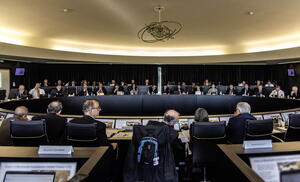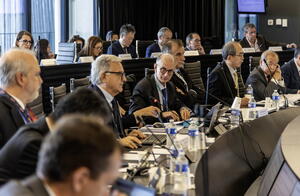Support for baseline approach
For the 35th time, the ITER Council has convened to review the progress of the ITER project, received presentations on the progress of construction, manufacturing, assembly, and licensing during its two day meeting on 20 and 21 November 2024. Discussions focused on the performance of the project against its work plan for this year and on the Proposed Baseline 2024. Based on the analyses carried out so far by the ITER Members, the Council endorsed the overall baseline approach.
Presented to the ITER Council in June 2024, the proposed Baseline 2024 prioritizes the start of substantial research operation as rapidly as possible. With a divertor, blanket shield blocks and other key components and systems in place, ITER's first operational phase, Start of Research Operation, will feature hydrogen and deuterium-deuterium plasmas that culminate in the operation of the machine in long pulses at full magnetic energy and plasma current. The proposed baseline also includes more time for integrated commissioning, the testing of some magnet coils at 4 K (minus 269 ° C), additional heating, and the availability of disruption mitigation. The material for the plasma-facing blanket first wall is also changing from beryllium to tungsten.
The ITER Council supported the use of Baseline 2024 by the ITER Organization, together with the Domestic Agencies, as a working plan for progress monitoring and operational management this year. And as reported to the Council this week, the project has performed according to the schedule of the proposed new baseline, with an execution rate that surpasses all previous years. Going forward, the Council approved the 2025 budget, which conforms to the proposed updated baseline, and requests continued efforts to reduce the risks of the project and optimize costs, through the determination of project phases and gates with appropriate milestones.
Other project advancements were reported, including the good progress of repair to critical components, the recent delivery of two additional vacuum vessel sectors (#1 and #5), sector module subassembly, the completion of all toroidal field coils, and the achievement of helium liquefaction in the ITER cryoplant—a precursor to other critical commissioning activities of the ITER plant. Council members also welcomed the channels that have been established for sharing knowledge with private sector fusion companies established after a major workshop in May.
Council members ended their visit to the ITER Organization by visiting different parts of the worksite and, for some, participating in a short ceremony for vacuum sector arrival.



